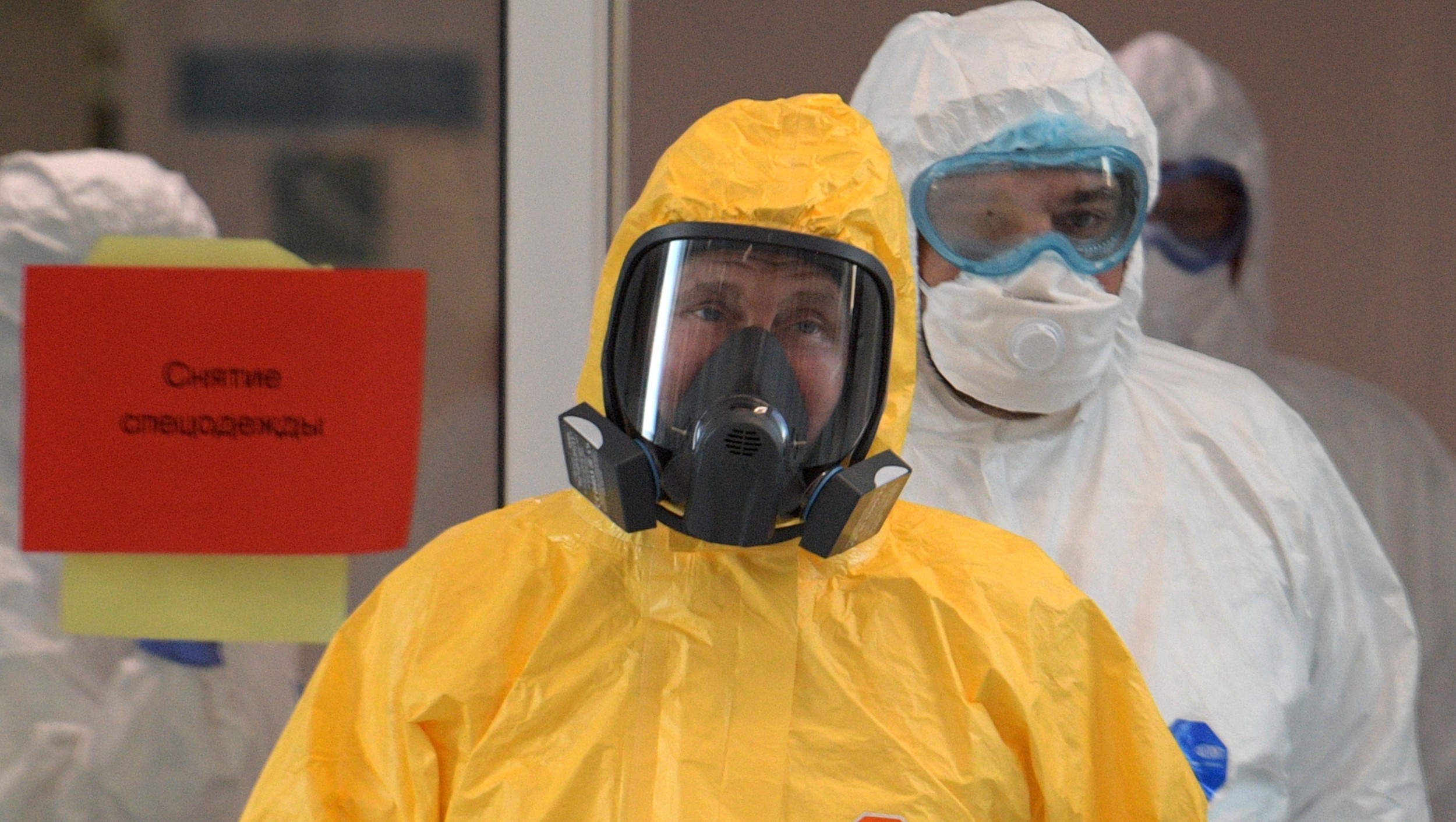Will coronavirus bring down Vladimir Putin?
The Russian president has rarely looked so vulnerable during his 20 year-reign

A free daily email with the biggest news stories of the day – and the best features from TheWeek.com
You are now subscribed
Your newsletter sign-up was successful
Vladimir Putin is celebrating the 20th anniversary of his first inauguration as Russian president, but the milestone comes at a treacherous moment for the former KGB agent.
In a blow to the Russian premier, a new survey by independent pollster Levada-Center has found that fewer than half of respondents - 46% - believe the Russian government has responded adequately to the coronavirus pandemic.
And Putin’s personal approval has dipped to 59% - still high by the standards of most world leaders, but a historic low for the Russian president.
The Week
Escape your echo chamber. Get the facts behind the news, plus analysis from multiple perspectives.

Sign up for The Week's Free Newsletters
From our morning news briefing to a weekly Good News Newsletter, get the best of The Week delivered directly to your inbox.
From our morning news briefing to a weekly Good News Newsletter, get the best of The Week delivered directly to your inbox.
How bad is coronavirus in Russia?
Russia yesterday reported more than 10,000 new cases of the Covid-19 coronavirus for the fourth day in a row, bringing the country’s total number of confirmed infections to 177,160.
The tally of deaths linked to the virus rose to 1,625 on Thursday, after 88 people died overnight.
Russia was “always going to struggle if a large outbreak occurred in the country, and experts predicted one almost certainly would due to the country’s proximity to China and tightly packed cities, including the capital, Moscow”, says Vox.
A free daily email with the biggest news stories of the day – and the best features from TheWeek.com
With those predictions now being borne out, Russia has the world’s fastest growing number of coronavirus infections, according to latest figures.
The capital has been hit particularly hard, with up to 2% of the population believed to be infected, Moscow Mayor Sergei Sobyanin said on Saturday. If correct, that would mean more than 240,000 infected people in the city - four times more than the official tally, reports The Guardian.
Hospitals across the country “are at breaking point” owing to “a chronic lack of basic medical equipment, including personal protective clothing (PPE), as well as eligible medical staff”, says the Daily Express.
The Ministry of Emergencies has warned of an “acute shortage” of ventilators, as regional authorities are told they face waits of up to three months for deliveries of PPE.
Is Putin in danger?
The Kremlin insists that volatile approval ratings are par for the course during a crisis such as that currently engulfing the world.
“It’s understandable that in such a difficult situation when people are losing their businesses, people are losing their salaries, people are suffering from staying at home, with their children, people are suffering from not being able to send their children to school. This is the reality we have to deal with,” Dmitry Peskov, Putin’s spokesperson, told CNBC.
He added that Putin “has said numerous times that for a statesman, it’s impossible to be dependent on your rating. Because if every day you’re nervous about your rating, you simply won’t be able to take responsible decisions.”
All the same, the political danger facing the long-serving Russian leader is obvious.
Lockdown measures that have been introduced in recent weeks may have rendered public protest impossible, but “Russians have taken their discontent online: one live-streamed discussion last week earned over 67,000 views on YouTube”, report CNN.
And while politicians and campaigners who criticise the president have often been silenced in the past, recent weeks have brought a growing chorus of dissent.
These critics include opposition leader Alexei Navalny, who is calling for the National Welfare Fund - a $165bn (£134bn) cushion of savings built from oil and gas sales - to be redistributed to help individuals and small enterprises hit by the pandemic.
–––––––––––––––––––––––––––––––For a round-up of the most important stories from around the world - and a concise, refreshing and balanced take on the week’s news agenda - try The Week magazine. Start your trial subscription today–––––––––––––––––––––––––––––––
Kremlin official Peskov has dismissed the idea as “populist” and “superficial”, but online petitions backing the proposal have been signed by more than a million people.
Amid the growing unrest, Putin has postponed a nationwide vote that would have paved the way for him to retain the presidency after his current term ends, potentially until 2036.
Instead of that consolidation of power, the result of the Covid-19 crisis is “a political system that becomes ever more fragile”, says Bloomberg. “Institutions are eroded, apathy is rising and there is low trust in the presidency and government.”
So will the Russian leader be able to hold onto the top spot for another 20 years? “For a president with no challengers, Putin has never looked so vulnerable,” the US news site concludes.
Arion McNicoll is a freelance writer at The Week Digital and was previously the UK website’s editor. He has also held senior editorial roles at CNN, The Times and The Sunday Times. Along with his writing work, he co-hosts “Today in History with The Retrospectors”, Rethink Audio’s flagship daily podcast, and is a regular panellist (and occasional stand-in host) on “The Week Unwrapped”. He is also a judge for The Publisher Podcast Awards.